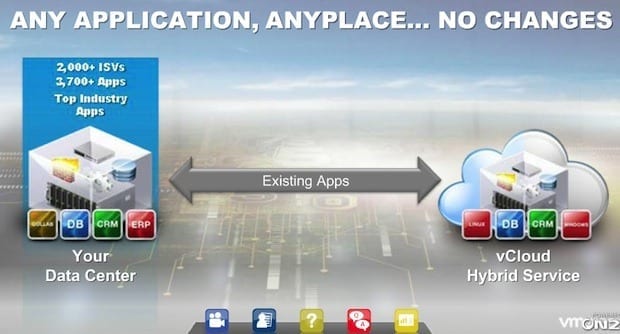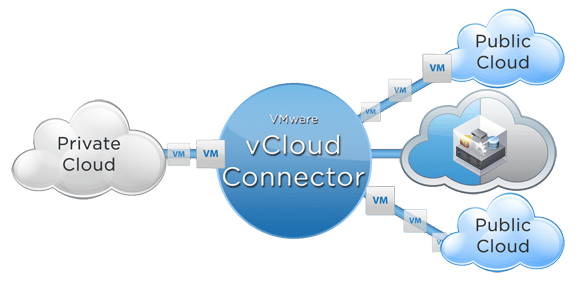Lately VMware’s touting the all-new VMware vCloud Hybrid Service (vCHS). This offering is a whole new product line for VMware meant to compete with the likes of Google Compute Engine, Amazon EC2, Microsoft Windows Azure public cloud offerings, and (to some degree) VMware’s own vCloud service providers. However, with other existing (and well known) public infrastructure clouds available, why should we care about another public cloud offering now from VMware? Let’s find out what makes vCHS unique and how it can help you.
Introducing VMware vCloud Hybrid Service (vCHS)
VMware’s hybrid cloud is an “infrastructure as a service“, or IaaS, public cloud. That means that you can run your virtual machines (or physical servers converted into virtual machine) in their cloud for a fee. Like all IaaS services, the benefit is that you don’t have to purchase, manage, and maintain your own physical servers in your own datacenter. Additionally, IaaS offers scalability such that adding additional computing capacity can be done in a few clicks of your mouse (as compared to the time that it would take for you to price out, get approved, order, install, and configure a new physical server in your own datacenter). Not only can you scale up, but you can also scale down; either way, you only pay for what you use. That scalability, elasticity, and pay-as-you-go pricing is found in just about all IaaS clouds.
And while we’re at it, don’t pronounce vCHS “vCHEESE.” VMware reps kindly ask that we just spell it out – v-C-H-S – or, you know, just saying “vCloud Hybrid Service” will work, too.
What Makes vCloud Hybrid Service Unique?
While I’m sure that VMware would tout multiple features and capabilities that make it unique, I’ll just point out what I believe are the three most important features, and I’ll talk about each of them in more detail.
- VMware’s Install Base
- VMware’s Ecosystem
- Designed for Enterprise Hybrid Cloud
VMware’s Install Base
First, let’s talk about VMware’s enterprise install base. How many of you run the Google hypervisor in your datacenter today? None, right? (It doesn’t exist.) Thus, those who are interested in moving to Google’s Compute IaaS cloud must first learn Google’s way of doing things, and then, most likely, create brand-new virtual machines in the Google cloud (or create them from a catalog). Additionally, Google Compute Engine only support Linux VMs.
Gee, Google isn’t sounding like an ideal solution to migrate your datacenter to, is it? What about Amazon Ec2? Amazon does have hybrid cloud (called Direct Connection), and it allows you to bring in your vSphere VMs (called EC2 Import/Export) however, coming from a VMware environment, neither of those are what I would call “easy,” nor is the Amazon documentation intuitive to follow (in fact, it doesn’t even have any pictures). If you don’t believe me, just try it to move one of your VMs to Amazon – I doubt it will be a fun experience.
However, for enterprises that are considering moving to a hybrid cloud, how many of those already use VMware? According to VMware’s own statistics, “More than 400,000 customers, including 100 percent of Fortune 500 and 100 percent of Fortune Global 100 companies, use VMware technologies and services. More than 80 percent of virtualized workloads and a large percentage of business critical applications are running on VMware technology.” Thus, moving to a VMware-based and VMware-run hybrid cloud is a natural fit for that massive install base and their massive number of virtual machines.
VMware’s Ecosystem
Second, VMware’s ecosystem around their products is strong. No other virtualization or cloud vendor has such a strong base of passionate datacenter practitioners, resellers, certified professionals, consultants, authors, trainers, bloggers, and sales channel. Search job openings to find out who is hiring those knowledgeable on VMware technologies vs other competing virtualization and cloud technologies. The most passion and interest lies where the technology is the strongest and where the demand is the greatest. VMware’s ecosystem gives them a strong advantage over other competing companies who are offering infrastructure cloud computing services but who lack hungry IT pros ready to test it, recommend it, and migrate to it.
Designed for Enterprise Hybrid Cloud
Third, VMware is matching this install base and ecosystem with what those enterprises need: a VMware-based hybrid cloud that can easily be connected to their existing private VMware infrastructure (whether or not that enterprise is using vCloud Director for private cloud). Those enterprises need capacity on demand, room for new test/dev environments, disaster recovery services, and a place to move the “low-hanging fruit.” Most of those servers are not Internet-facing, so a secure, elastic, and scalable hybrid cloud that can easily accept your existing VMware vSphere VM’s is a natural fit. Finally, because this is vSphere talking to vSphere, there is no “Hotel California” syndrome where you can not get your VMs out once they are in the cloud (something VMware’s former CEO, Paul Martiz accused Amazon AWS of at the time). This connection is made with VMware’s free virtual appliance solution, vCloud Connector.
Finally, contrary to what some software companies and cloud providers tell you, not all hypervisors are equal, not all clouds are equal, and YES, YOU SHOULD CARE. Too many people are saying “the hypervisor doesn’t matter now” and “infrastructure cloud computing is a commodity” (both are statements I generally disagree with). Perhaps those statements are true in some cases, but for the 400K enterprises who already use VMware vSphere, they would love to have the option to run some of their infrastructure on a reliable, secure, compatible, and non-Internet-facing (hybrid) cloud and the new vCHS is the logical choice.
For more information about vCloud Hybrid Service, watch this introduction to VMware vCloud Hybrid Service video and check out the vCHS Quick Start Guide at the vCloud website.





